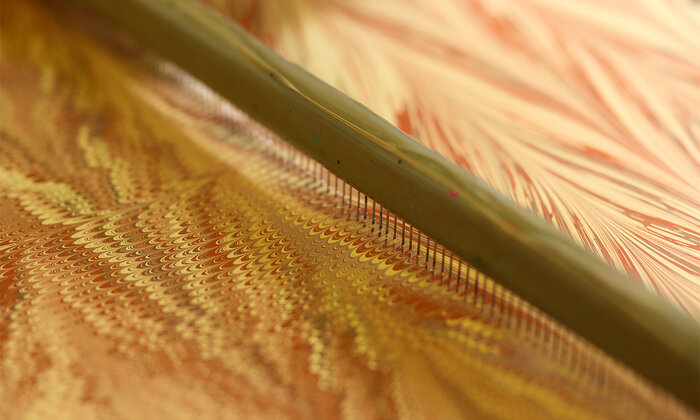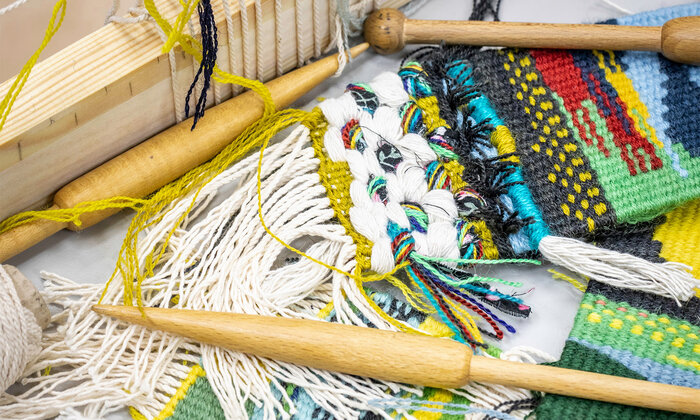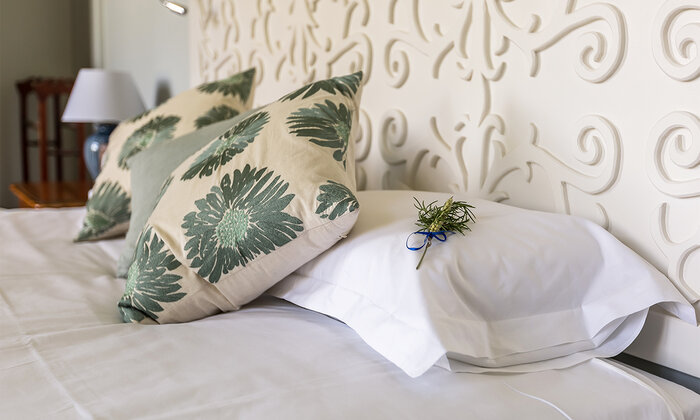
Fine Art
Online Foundation Certificate in Art and Design
Virtual Open Day - 15 April 2026 - Register now
Award: Foundation Certificate in Art & Design
Duration: 1 academic year, part-time (January & April 2026)
School: School of Arts
Campus: Online
This flexible foundation programme in art and design is taught online through a mix of self-directed study, live study days and a student community hub.
Designed to fit around your day-to-day commitments, the programme will help you to establish momentum and resilience in your creativity. Supported by an online community of students and tutors you will improve competence and confidence in the core skills in art and design.
You can expect to:
- Develop practical and creative skills in a broad range of mediums and subjects, including drawing, painting, printmaking, and sculpture.
- Find direction in your creative practice and future goals.
- Complete a portfolio of work suitable to make applications to higher level study, or to show to galleries and other artist opportunities.

Gallery











Online exhibition
A selection of work completed by students on each intake of the Online Foundation Certificate in Art and Design is available to view in a new online exhibition. The exhibition celebrates each individual student's work and their experience on the programme.
Image: 'Restraint' by Sarah, OFCAD 1.

School of Arts
Explore and expand your work in a uniquely immersive environment with its own connections to art history. Our School of Arts students enjoy specialist studio spaces dedicated to painting and drawing, sculpture and tapestry and textile-based work as well as exceptional exhibition space.
Fees
OFCAD 14 - January 2026
- £1,890 paid in full, in advance, or £687 paying in three instalments
If you would like to pay the full price of £1,890 please contact the Bookings Office on 01243 818 300 option 2. If you would like to pay in instalments, you can pay the first instalment online (see below). The second instalment will be due after Tutorial one and third instalment will be due after Tutorial two. See dates.
OFCAD 15 - April 2026
- £1,890 paid in full, in advance, or £687 paying in three instalments
If you would like to pay the full price of £1,890 please contact the Bookings Office on 01243 818 300 option 2. If you would like to pay in instalments, you can pay the first instalment online. The second instalment will be due after Tutorial one and third instalment will be due after Tutorial two. See dates.
Fees include all tuition and tutorials, materials are not included.
We may routinely increase our course fees from year to year for one-year courses as well as courses lasting two or more years and may review and change such course fees without notice.
Entry requirements
- A commitment to learning practical and creative skills
- Space and time to complete coursework and attend live study days
- A webcam and reliable Wi-Fi (see FAQs)
How to apply
Spaces on this course are limited. To book a place, you will need to:
1- Complete the application form and send it to [email protected]
2- Pay the first fee installment, via our online booking system:
- OFCAD14 - January 2026 - Make a Payment
- OFCAD15 - April 2026 - Make a Payment
Or, if you wish to take advantage of our reduced advanced price and pay in full, please contact the Bookings team on (01243) 818 300 to make your payment.
Any questions?
Email [email protected]; call us on: (01243) 818 300 and select option 1, or read more about our Admissions processes.
School of Arts news

Life after Graduation: Art with Pippa Blake
For artist and West Dean alumna Pippa Blake, the road (or rather the sea) to a career in painting has been anything but conventional. A graduate of the very first Visual Arts postgraduate diploma cohort in 2004 (now the Graduate Diploma in Fine Art), Pippa has led a rich life that spans continents, adventures, loss, and rediscovery.
“I’ve always been a painter,&rdquo...

The Regis School sculpt in the landscape
Short course tutor Dan Lobb recently visited The Regis School to deliver Sculpture in the Landscape workshops to Years 9 and 10 as part of their Super Curricular day. Pupils were off-timetable for the day, participating in creative activities they wouldn’t normally have the chance to do. In his introduction, Dan explained that this session was about using materials found naturall...

Realising the dream of becoming an artist
By Jo Boddy, Foundation Diploma in Art and Design alumna 2021

St Philip Howard Life Drawing Day
West Dean College of Arts and Conservation recently welcomed 30 budding Year 10 artists from St Philip Howard Catholic School for a life drawing lesson delivered by artist and tutor, Chris Gilvan-Cartwright.
As well as learning new techniques with paints and charcoal and experiencing the freedom of large scale drawing, pupils commented on how they enjoyed taking risks and being brave ...

6 Tips for getting creative this autumn
By Tiffany Robinson, Programme Coordinator and Tutor - Foundation Diploma Art and Design & Online Foundation Certificate in Art and Design
As the long summer days begin to recede comes the autumn light that gives rich intensity at the start or end of the day, I have put together tips focusing on experiencing the light, and the land to make more visceral responses in...

Studying an object from the Edward James Collection: Silver porringer
By Finn Banwell, Foundation Degree Arts - Metalwork student I first became interested in metalwork when I visited a Japanese silversmith’s workshop. Whilst exploring Kyoto, I found “Artsmith”, a local shop selling a variety of craft pieces and very detailed, intricate examples of metalwork. Also, in this shop, was a workshop, where the Craftsman and owner of ...
Tutors

Tiffany Robinson
Programme Coordinator - Foundation Diploma in Art and Design
Tiffany Robinson studied interactive media for her MA (2005) making art films and immersive sci-art installations on perception and nanoscale. She is currently a tutor, mentor (The Art of Enquiry) and walking artist making intuitive drawings using natural and digital media. Her work deals with a post-modern estrangement from nature towards a being more than human through alignment with nature.



